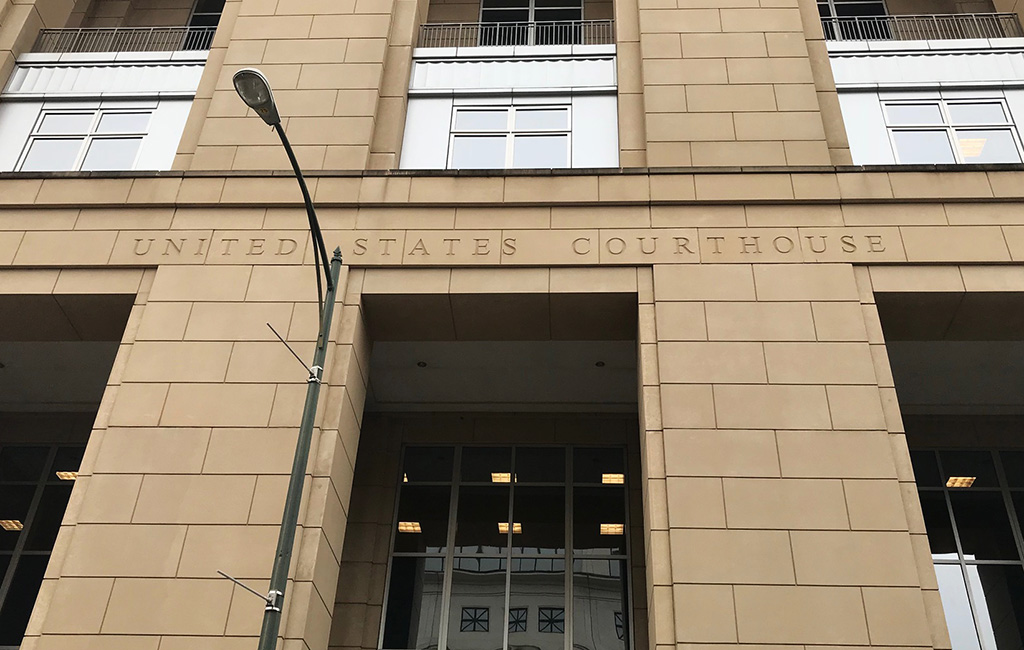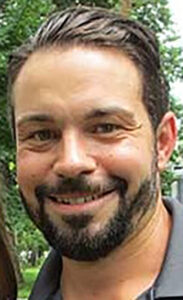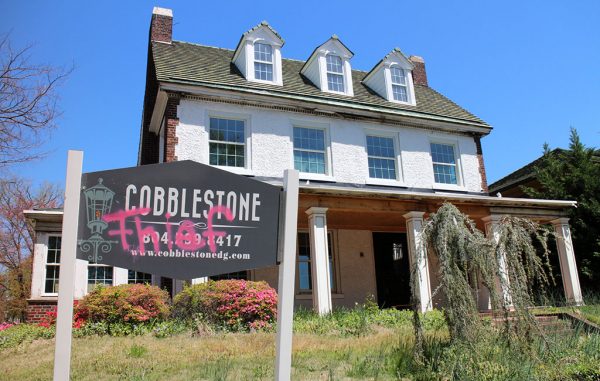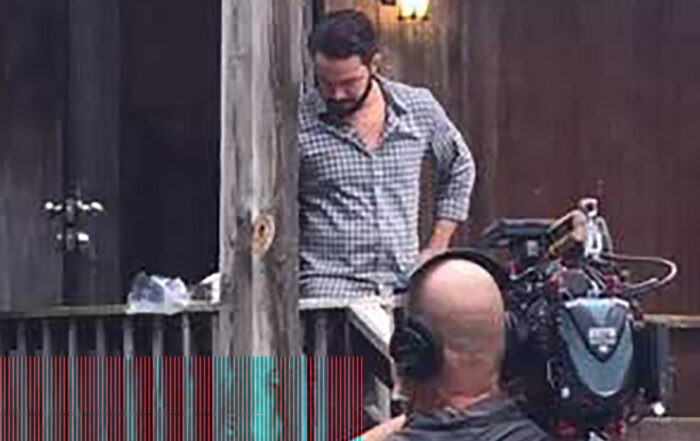
Josh Romano, a once-prominent local house flipper, was found guilty on four counts of fraud and embezzlement charges by a federal jury. (BizSense file images)
A federal jury has found once-prominent local house-flipper Josh Romano guilty on four counts of fraud and embezzlement charges and not guilty on three other counts.
The verdict was delivered to Senior U.S. District Court Judge Robert Payne late Thursday afternoon after about seven hours of deliberations.
Romano was released under the terms of his previous bond and is scheduled to be sentenced Jan. 19. He’s required to wear an electronic monitoring device until then.
The jury found Romano guilty of conspiracy to commit bank fraud and three of five counts of committing wire fraud. He was found not guilty on the other wire fraud counts and not guilty of lying under oath in his bankruptcy proceedings. Two other counts were dismissed over the course of the trial.
In comments after the verdict, Romano’s attorney, Vaughan Jones, described the jury’s findings as a “mixed bag” that does not fully convict or exonerate Romano.
“He was initially charged with a nine-count indictment, and he was acquitted of five of the charges ultimately, either through the jury’s verdict or through dismissal by the government. I think ultimately that is reflective of how this case isn’t what anybody thinks it seemed on its face,” Jones said.
“It’s not a complete exoneration of Mr. Romano that nothing bad happened, nor is it a picture-perfect example of this poorly-intentioned house-flipper who committed these intentional frauds with the intention to hurt people. It really is a mixed bag all the way around,” he said.
Jones said any decision on an appeal would come after Payne delivers his final judgment in January.
The verdict followed a three-day trial that saw Romano, 40, take the stand in his own defense. He faces maximum penalties of up to 20 years in prison on each of the four counts, though his sentence is expected to be lighter. Sentencing guidelines also call for a $250,000 fine, full restitution, forfeiture of assets and three years’ supervised release.
Prosecutors alleged that Romano conspired with Lindsey Passmore, at the time a paralegal with local real estate law firm S. Page Allen & Associates, to defraud Tuckahoe Funding, a so-called hard money lender owned by area homebuilder Rhett Starke.
The indictment that a federal grand jury handed down in March alleged that the scheme involved $1.2 million in funds that were disbursed from escrow accounts for six home rehab projects without Starke’s authorization.
The law firm, led by real estate attorney Page Allen, was responsible for authorizing construction draws to Romano with approval from Starke, and the funds were supposed to be put toward the respective project for each account.
Prosecutors said the funds were instead put toward other projects and that Romano put some toward personal expenses, such as membership dues to Richmond Country Club and private school tuition.
Passmore, 39, who initially pleaded not guilty along with Romano, entered into a plea agreement in August in which she agreed to plead guilty to the conspiracy count and testify in the case in hopes of a lighter sentence. Her sentencing is scheduled Nov. 17.
Passmore testified that Romano was frustrated that he couldn’t freely touch the escrow funds even though he was paying interest on the loans. She said it was her idea to move funds between accounts and documented the embezzlement with the understanding that Romano would pay the money back with profits from other projects he’d complete.
The funds were not paid back and were ultimately lost, leaving some homeowners or buyers with incomplete houses. Some of the projects were completed by other builders after Starke bought them back through deeds in lieu of foreclosure.
Romano testified that he requested the draws but did not know they were coming from escrow accounts for different projects. He put the blame for the missing funds on Passmore and Allen, who he claimed stole the funds and misappropriated them without his knowledge.
Starke and Allen later mediated a settlement in which Allen paid Starke $525,000 with funds borrowed on her life insurance and pulled from her retirement account. Prosecutors mentioned during the trial that Allen is under investigation by the Virginia State Bar, which had an investigator present at the courthouse this week.
Romano’s original seven-count indictment was expanded in August to include two additional counts alleging bankruptcy fraud and lying under oath in bankruptcy proceedings. The bankruptcy fraud count was ultimately dismissed, as was one of the six wire fraud counts.
Highs and lows
At one point renovating and selling nearly 30 homes in a year, Romano’s Cobblestone Development Group hit a high point in 2017 when it was featured in an HGTV pilot called “Richmond Rehabbers” that was not picked up for a series.
Prosecutors said that was the same year that the alleged scheme came to a head, with Romano and Starke each questioning Passmore and Allen about discrepancies with the escrow funds.
Starke, 64, who met Romano in 2015 through an introduction by Passmore, testified that he inquired about the funds after observing that work on several of Romano’s projects was not progressing in mid-2017. He said he was concerned about Romano accruing interest and floated the idea of moving funds from one escrow account to another, but via loan refinancing and under his direction.
Passmore admitted that balances she presented to Starke were fraudulent and were nowhere close to the little to no funds that remained in the accounts. According to the federal indictment in the case, the reported account balances for the six projects totaled more than $1 million, whereas the actual funds that remained totaled $676.
Other witnesses who were called to the stand testified that Romano continued to buy up properties despite being underwater financially on some houses, in one case having to bring $70,000 to closing to complete a sale.
Kyle Benusa, a business consultant who advised Romano in 2016, said Romano’s business liabilities exceeded assets by $1 million and questioned whether expenses on such things as an architect, project managers and other consultants were necessary.
Benusa also said he found that the escrow accounts for the six Starke projects at issue were at or near zero, and that when told about it, Romano did not react surprised and said the money had been stolen or moved without his knowledge.
Dan Allen, who oversaw operations for Romano from 2016 to 2017, said he determined that interest payments on loans Romano was taking were causing his projects to get underwater. He said he advised Romano to stop buying up properties but that Romano maintained that inventory could dry up and he wanted to make sure there were more projects in the pipeline.
Breese Romano, Josh’s wife at the time, testified that publicity from the Richmond Rehabbers show put pressure on Josh to succeed with his business and keep work coming, describing the scenario as a waterfall effect that made them wonder why they couldn’t have the funds to get more projects done. She and Josh are now separated and pursuing a divorce.
Josh Romano wound down Cobblestone in 2018 amid mounting debt and disputes with former clients. He filed for Chapter 7 bankruptcy later that year, and faced a lawsuit from Starke as part of those proceedings that he ultimately won, with the bankruptcy judge siding with Romano in placing blame for the missing funds on S. Page Allen & Associates. Passmore did not testify in that case.
When he took the stand as the last witness in the trial, Romano maintained that his job “was bricks and sticks” and he left the accounting and other financial work to others, including Passmore, who he’d hired for a time to handle his finances. He said he never asked Passmore to move around funds as she’d suggested, and he said Starke had said he was OK with the concept of moving funds between projects.
In his closing argument, Assistant U.S. Attorney Michael Moore argued that Romano was reframing past events in an effort to push Passmore “under the bus” and avoid blame for the funds being misappropriated. Moore called Romano’s testimony gaslighting “to make it look like Mrs. Passmore did this all herself.”
In encouraging the jury to find a guilty verdict, Moore said Romano could be found guilty of conspiring with Passmore even if there was no written agreement.
“You can infer an agreement with Lindsey Passmore disbursing draws at Joshua Romano’s request even if they didn’t say it,” Moore said, adding that if a person gets someone to do something criminal on their behalf, they’re just as guilty. “Romano,” he said, “is just as guilty as she is because he induced her to do it.”
Bankruptcy complaints revived
While the federal trial has come to a close, back in bankruptcy court Romano is facing a second attempt by Starke and former client Melissa Bass to recover funds they say they are owed.
Starke’s Tuckahoe Funding and Bass filed a complaint last month seeking to recover funds that U.S. Bankruptcy Judge Kevin Huennekens allowed to be discharged as part of Romano’s case.
Starke and Bass had filed separate petitions in recent years seeking to prevent debt that they were looking to collect from being discharged, asserting damages of at least $750,000 in Starke’s case and nearly $240,000 for Bass, whose complaint stemmed from a renovation of her residence that she said was not completed on time and required repairs to finish and correct code violations.
Huennekens denied Bass’s request and ruled her award dischargeable, finding that she failed to prove that Romano committed fraud, as alleged, by not completing her renovation as promised. The following year, Huennekens dismissed Tuckahoe Funding’s suit, siding with Romano in placing blame for the missing funds on S. Page Allen & Associates.
Those rulings were made before the federal case against Romano was brought in March. Starke and Bass’s bankruptcy complaint alleges one count of false oaths or other forms of fraud and refers to the federal indictment in seeking the discharge revocation and other relief.

Josh Romano, a once-prominent local house flipper, was found guilty on four counts of fraud and embezzlement charges by a federal jury. (BizSense file images)
A federal jury has found once-prominent local house-flipper Josh Romano guilty on four counts of fraud and embezzlement charges and not guilty on three other counts.
The verdict was delivered to Senior U.S. District Court Judge Robert Payne late Thursday afternoon after about seven hours of deliberations.
Romano was released under the terms of his previous bond and is scheduled to be sentenced Jan. 19. He’s required to wear an electronic monitoring device until then.
The jury found Romano guilty of conspiracy to commit bank fraud and three of five counts of committing wire fraud. He was found not guilty on the other wire fraud counts and not guilty of lying under oath in his bankruptcy proceedings. Two other counts were dismissed over the course of the trial.
In comments after the verdict, Romano’s attorney, Vaughan Jones, described the jury’s findings as a “mixed bag” that does not fully convict or exonerate Romano.
“He was initially charged with a nine-count indictment, and he was acquitted of five of the charges ultimately, either through the jury’s verdict or through dismissal by the government. I think ultimately that is reflective of how this case isn’t what anybody thinks it seemed on its face,” Jones said.
“It’s not a complete exoneration of Mr. Romano that nothing bad happened, nor is it a picture-perfect example of this poorly-intentioned house-flipper who committed these intentional frauds with the intention to hurt people. It really is a mixed bag all the way around,” he said.
Jones said any decision on an appeal would come after Payne delivers his final judgment in January.
The verdict followed a three-day trial that saw Romano, 40, take the stand in his own defense. He faces maximum penalties of up to 20 years in prison on each of the four counts, though his sentence is expected to be lighter. Sentencing guidelines also call for a $250,000 fine, full restitution, forfeiture of assets and three years’ supervised release.
Prosecutors alleged that Romano conspired with Lindsey Passmore, at the time a paralegal with local real estate law firm S. Page Allen & Associates, to defraud Tuckahoe Funding, a so-called hard money lender owned by area homebuilder Rhett Starke.
The indictment that a federal grand jury handed down in March alleged that the scheme involved $1.2 million in funds that were disbursed from escrow accounts for six home rehab projects without Starke’s authorization.
The law firm, led by real estate attorney Page Allen, was responsible for authorizing construction draws to Romano with approval from Starke, and the funds were supposed to be put toward the respective project for each account.
Prosecutors said the funds were instead put toward other projects and that Romano put some toward personal expenses, such as membership dues to Richmond Country Club and private school tuition.
Passmore, 39, who initially pleaded not guilty along with Romano, entered into a plea agreement in August in which she agreed to plead guilty to the conspiracy count and testify in the case in hopes of a lighter sentence. Her sentencing is scheduled Nov. 17.
Passmore testified that Romano was frustrated that he couldn’t freely touch the escrow funds even though he was paying interest on the loans. She said it was her idea to move funds between accounts and documented the embezzlement with the understanding that Romano would pay the money back with profits from other projects he’d complete.
The funds were not paid back and were ultimately lost, leaving some homeowners or buyers with incomplete houses. Some of the projects were completed by other builders after Starke bought them back through deeds in lieu of foreclosure.
Romano testified that he requested the draws but did not know they were coming from escrow accounts for different projects. He put the blame for the missing funds on Passmore and Allen, who he claimed stole the funds and misappropriated them without his knowledge.
Starke and Allen later mediated a settlement in which Allen paid Starke $525,000 with funds borrowed on her life insurance and pulled from her retirement account. Prosecutors mentioned during the trial that Allen is under investigation by the Virginia State Bar, which had an investigator present at the courthouse this week.
Romano’s original seven-count indictment was expanded in August to include two additional counts alleging bankruptcy fraud and lying under oath in bankruptcy proceedings. The bankruptcy fraud count was ultimately dismissed, as was one of the six wire fraud counts.
Highs and lows
At one point renovating and selling nearly 30 homes in a year, Romano’s Cobblestone Development Group hit a high point in 2017 when it was featured in an HGTV pilot called “Richmond Rehabbers” that was not picked up for a series.
Prosecutors said that was the same year that the alleged scheme came to a head, with Romano and Starke each questioning Passmore and Allen about discrepancies with the escrow funds.
Starke, 64, who met Romano in 2015 through an introduction by Passmore, testified that he inquired about the funds after observing that work on several of Romano’s projects was not progressing in mid-2017. He said he was concerned about Romano accruing interest and floated the idea of moving funds from one escrow account to another, but via loan refinancing and under his direction.
Passmore admitted that balances she presented to Starke were fraudulent and were nowhere close to the little to no funds that remained in the accounts. According to the federal indictment in the case, the reported account balances for the six projects totaled more than $1 million, whereas the actual funds that remained totaled $676.
Other witnesses who were called to the stand testified that Romano continued to buy up properties despite being underwater financially on some houses, in one case having to bring $70,000 to closing to complete a sale.
Kyle Benusa, a business consultant who advised Romano in 2016, said Romano’s business liabilities exceeded assets by $1 million and questioned whether expenses on such things as an architect, project managers and other consultants were necessary.
Benusa also said he found that the escrow accounts for the six Starke projects at issue were at or near zero, and that when told about it, Romano did not react surprised and said the money had been stolen or moved without his knowledge.
Dan Allen, who oversaw operations for Romano from 2016 to 2017, said he determined that interest payments on loans Romano was taking were causing his projects to get underwater. He said he advised Romano to stop buying up properties but that Romano maintained that inventory could dry up and he wanted to make sure there were more projects in the pipeline.
Breese Romano, Josh’s wife at the time, testified that publicity from the Richmond Rehabbers show put pressure on Josh to succeed with his business and keep work coming, describing the scenario as a waterfall effect that made them wonder why they couldn’t have the funds to get more projects done. She and Josh are now separated and pursuing a divorce.
Josh Romano wound down Cobblestone in 2018 amid mounting debt and disputes with former clients. He filed for Chapter 7 bankruptcy later that year, and faced a lawsuit from Starke as part of those proceedings that he ultimately won, with the bankruptcy judge siding with Romano in placing blame for the missing funds on S. Page Allen & Associates. Passmore did not testify in that case.
When he took the stand as the last witness in the trial, Romano maintained that his job “was bricks and sticks” and he left the accounting and other financial work to others, including Passmore, who he’d hired for a time to handle his finances. He said he never asked Passmore to move around funds as she’d suggested, and he said Starke had said he was OK with the concept of moving funds between projects.
In his closing argument, Assistant U.S. Attorney Michael Moore argued that Romano was reframing past events in an effort to push Passmore “under the bus” and avoid blame for the funds being misappropriated. Moore called Romano’s testimony gaslighting “to make it look like Mrs. Passmore did this all herself.”
In encouraging the jury to find a guilty verdict, Moore said Romano could be found guilty of conspiring with Passmore even if there was no written agreement.
“You can infer an agreement with Lindsey Passmore disbursing draws at Joshua Romano’s request even if they didn’t say it,” Moore said, adding that if a person gets someone to do something criminal on their behalf, they’re just as guilty. “Romano,” he said, “is just as guilty as she is because he induced her to do it.”
Bankruptcy complaints revived
While the federal trial has come to a close, back in bankruptcy court Romano is facing a second attempt by Starke and former client Melissa Bass to recover funds they say they are owed.
Starke’s Tuckahoe Funding and Bass filed a complaint last month seeking to recover funds that U.S. Bankruptcy Judge Kevin Huennekens allowed to be discharged as part of Romano’s case.
Starke and Bass had filed separate petitions in recent years seeking to prevent debt that they were looking to collect from being discharged, asserting damages of at least $750,000 in Starke’s case and nearly $240,000 for Bass, whose complaint stemmed from a renovation of her residence that she said was not completed on time and required repairs to finish and correct code violations.
Huennekens denied Bass’s request and ruled her award dischargeable, finding that she failed to prove that Romano committed fraud, as alleged, by not completing her renovation as promised. The following year, Huennekens dismissed Tuckahoe Funding’s suit, siding with Romano in placing blame for the missing funds on S. Page Allen & Associates.
Those rulings were made before the federal case against Romano was brought in March. Starke and Bass’s bankruptcy complaint alleges one count of false oaths or other forms of fraud and refers to the federal indictment in seeking the discharge revocation and other relief.






Elsewhere people are murdering in cold blood and the DAs let them off with a scolding. This case smells of something vindictive.
Get your nose checked, smells like justice to everyone else.
Wow that’s crazy – where are these cold blooded murderers getting let off with a scolding? I’m sure you have ample facts to support such an explosive allegation.
Vindictive? He was tried by a jury of his peers. Welcome to the American Justice System and due process. Better idea for Mr. Romano, don’t be a thief. Then, you don’t have to worry about going to jail. Such a novel concept.
What a strange comparison to make, but far from vindictive.
I’ll take “things that never happen” for $400, Alex.
Ankle monitor, check. Guilty on 4 counts, check. Embezzled, check. However, the defense attorney says it’s not a full guilty. 4 out of 7, last I checked is more than 50%, I’d take those odds any day of the week. He’s a criminal. Can everyone stop dancing around the obvious? He didn’t just rob Peter. He robbed the 70+people in his bankruptcy not just of money. He robbed them of their time, reputations and peace of mind.
Lock him up!
What a smug son of a gun! Karma will get him very soon!
ya…hopefully, some prison justice….
I’ve seen some of these Cobblestone houses around town. The one that was on TV, the paint was chipping off because it wasn’t primed properly. There was one in Carytown where the siding was falling off. Couple more in the Northside that had the same issue with paint. Pretty sure if you line up the Cobblestone clients, all will have some stories. But, I’ll tell you, Missy definitely took the brunt of it and she didn’t deserve the mess she got. 9 building code violations, 7 of them were fire issues . City of Richmond just shrugged it off and… Read more »